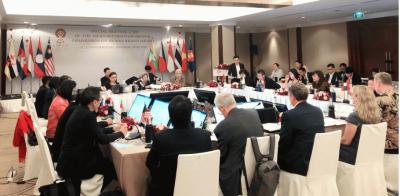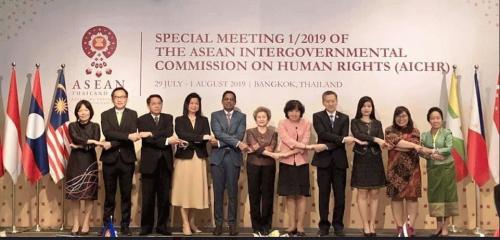- TOP
- 資料館
- FOCUS
- December 2019 - Volume 98
- AICHR: Ten Years of Promoting and Protecting Human Rights in ASEAN
FOCUS December 2019 Volume 98
AICHR: Ten Years of Promoting and Protecting Human Rights in ASEAN
When the Association of Southeast Asian Nations (ASEAN) was formed in 1967 by five founding states (Indonesia, Malaysia, the Philippines, Singapore and Thailand) through the ASEAN Declaration, later known as the Bangkok Declaration, human rights were not mentioned as one of its raison d’etre. In fact, the focus of the Bangkok Declaration was to agree among member-states—in response to the post-cold war context—to prevent disputes from developing into violent conflicts and to find common solution to them.
Twenty six years later, during the Twenty-Sixth ASEAN Ministerial Meeting in Singapore (23-24 July 1993), the ASEAN Foreign Ministers welcomed the international consensus achieved during the World Conference on Human Rights held in Vienna in June 1993 and "reaffirmed ASEAN’s commitment to and respect for human rights and fundamental freedoms as set out in the Vienna Declaration."1 They also “emphasized that the promotion and protection of human rights should not be politicized.” The ASEAN Foreign Ministers “agreed that ASEAN should also consider the establishment of an appropriate regional mechanism on human rights.”2
However, ASEAN had been slow in fulfilling its commitment to develop a regional mechanism on human rights. The 1997 Asian financial crisis provided an avenue for ASEAN member-states to revisit their strategy for regional integration. Some of ASEAN’s founding members —Indonesia, Thailand and the Philippines — proposed a new strategy to restore the confidence of the foreign investors by incorporating some values such as human rights, democracy and the rule of law as a promise toward the path to prosperity under the ASEAN regionalism project.
By agreeing to embrace human rights, ASEAN introduced a new face of the grouping that promised to be more predictable, participatory and accountable, among others. Accordingly, the period of 2007 to 2017 witnessed the proliferation of human rights institutions and instruments, such as the establishment of the ASEAN Intergovernmental Commission on Human Rights (AICHR) in 2009 and the ASEAN Commission on the Promotion and Protection of the Rights of Women and Children (ACWC) in 2010, and the adoption of the ASEAN Human Rights Declaration (AHRD) in 2012, the Declaration on Violence against Women and Violence against Children in ASEAN (DEVAWC) in 2013, the ASEAN Convention against Trafficking in Persons, especially Women and Children (ACTIP) in 2015, and the ASEAN Consensus on the Promotion and Protection of the Rights of Migrant Workers in 2017.3
This chronological account shows that in the course of forty years since its establishment, ASEAN has shifted from non-discussion on human rights to engagement with human rights in its own term and pace.
It is interesting that ASEAN’s changing position on human rights occurs in the context of differing perceptions on human rights of its member-states. Some still view human rights as instrument of powerful countries in obtaining favorable trade and international cooperation arrangements, while others perceive human rights as a threat to national sovereignty.
Not only perception about human rights, the record of ratifications of international human rights instruments is also varied among ASEAN member-states, as shown in Table 1.
Table 1. Ratified international human rights instruments
|
Country |
ICESR |
CAT |
CERD |
CEDAW |
CRC |
CED |
CRPD |
|
|
Brunei |
|
|
|
|
x |
x |
|
x |
|
Cambodia |
x |
x |
x |
x |
x |
x |
x |
x |
|
Indonesia |
x |
x |
x |
x |
x |
x |
signed |
x |
|
Laos |
x |
x |
x |
x |
x |
x |
signed |
x |
|
Malaysia |
|
|
|
|
x |
x |
|
x |
|
Myanmar |
|
|
|
|
x |
x |
|
x |
|
Philippines |
x |
x |
x |
x |
x |
x |
|
x |
|
Singapore |
|
|
|
|
x |
x |
|
x |
|
Thailand |
x |
x |
x |
x |
x |
x |
signed |
x |
|
Vietnam |
x |
x |
x |
x |
x |
x |
|
x |
AICHR
The AICHR was established in 2009 with the primary objective to promote and protect human rights. AICHR has been criticized for having too much promotion of human rights and less on their protection.
AICHR has the mandate, to mention a few, (a) to encourage ASEAN member-states to consider acceding to and ratifying international instruments related to human rights, (b) to develop an ASEAN Cooperation Framework for human rights, (c) to prepare studies on thematic issues of human rights, (d) to obtain information from ASEAN member-states on the promotion and protection of human rights, (e) to develop common strategies, approaches and positions on human rights, (f) to promote capacity-building for government officials and public awareness of human rights among the peoples of ASEAN and, (g) to engage in dialogue and consultation with other ASEAN stakeholders.
2019 marks the tenth anniversary of the AICHR in promoting and protecting human rights in the region. It has completed fifty-three study reports containing important information on human rights situations and recommendations. In 2018, under the broad theme of access to justice, thematic studies were made on legal aid, right to life (which examined the treatment of persons who are convicted with the death penalty), and juvenile justice (which explored the interrogation practices of children in conflict with the law).5
AICHR has also covered issues related to civil-political rights, such as the right to nationality, migration and human rights, trafficking in persons, prevention of torture, freedom of opinion and expression, freedom of religion and belief, right to life, and access to justice. In the area of economic, social and cultural rights, AICHR has generated discourses related to right to development, Millennium Development Goals (MDGs) and human rights, right to environment, right to water and sanitation, right to education and right to health. AICHR conducted activities in relation to the right to peace.
AICHR has also become a learning and information-sharing platform for the ASEAN member-states on human rights issues, which was not imaginable ten years ago. In terms of engaging stakeholders, AICHR has dealt with different groups in society, such as women, children, youth, persons with disabilities, journalists, Chief Justices of the courts, scholars, members of the private sectors, commissioners of national human rights institutions, officials of ASEAN governments as well as members of ASEAN Ministerial Sectoral Bodies on political and security, economic, and socio-cultural matters.6
In over a decade, AICHR has implemented its mandates, except on obtaining information from ASEAN member-states on the promotion and protection of human rights (Paragraph 4.10, AHRD) and providing advisory services and technical assistance to member-states, upon request (Paragraph 4.7). Responding to this gap, AICHR has been focusing its work on providing advice, guidance or recommendation to the ASEAN Sectoral Bodies on the implementation of the AHRD.
The recommendations serve as the language of human rights for cooperation and action as they elaborate the state obligations, the indivisibility and interrelated characters of human rights and their operationalization. Accordingly, on 11-12 November 2019 in Jakarta, AICHR held a consultation on the realization of Article 37 of the AHRD on the right to development. On 8-10 December 2019, AICHR also organized a consultation on the implementation of Article 23 of the AHRD related to freedom of opinion and expression, and on 11-13 December 2019 on the implementation of Article 22 on the AHRD on freedom of religion and belief. The latter two activities were held in Bali.
While AICHR is moving forward, it should be noted that the inability of the AICHR to conduct fact-finding, monitoring and investigation of human rights violations cases remains the challenge in performing its role on human rights protection in the subregion. AICHR also suffers from the lack of independence of its country representatives.
Despite the limitations, AICHR can undertake activities such as “hearing” the stories of victims and developing a referral system to address cross-border human rights issues. Referral is a process by which the immediate needs of a victim are assessed to help gain access to comprehensive and supportive services provided by various agencies or organizations which are not provided by the referring agency (AICHR).
It is worthwhile to mention that AICHR was launched in 2009 at the time of the adoption of a roadmap for the ASEAN Community (see Cha-Am Hua Hin Declaration7), and was envisioned to evolve into an overarching institution that is responsible for both protection and promotion of human rights and guided by the forward-looking human rights strategies and regular review of terms of reference (TOR) every five years.
In July 2019, the ASEAN Foreign Ministers assigned the review of the TOR of AICHR to the Senior Officials’ Meeting (SOM). In November 2019, the SOM reached a consensus to form a Panel of Experts consisting of representatives from the ten ASEAN member-states. The Panel of Experts is expected to start working in 2020.
AICHR has a long way to go to become a credible human rights mechanism in Southeast Asia. To realize this, not only the ASEAN member-states’ political will to take the necessary measures is needed but also the participation of all stakeholders in monitoring the work of AICHR to inform it of its performance.
Yuyun Wahyuningrum is the Representative of Indonesia to the ASEAN Intergovernmental Commission on Human Rights (AICHR), 2019-2021.
For further information, please contact: Yuyun Wahyuningrum at wahyuningrum@gmail.com.
Endnotes
1 Paragraph 16, Joint Communique of the Twenty-Sixth ASEAN Ministerial Meeting Singapore, 23-24 July 1993. Full text available at https://asean.org/?static_post=joint-communique-of-the-twenty-sixth-asean-ministerial-meeting-singapore-23-24-july-1993.
2 Ibid., paragraph 18.
3 These documents are available at the ASEAN website:
1. ASEAN Human Rights Declaration - https://asean.org/asean-human-rights-declaration/
2. Declaration on Violence against Women and Violence against Children in ASEAN - https://asean.org/?static_post=declaration-on-the-elimination-of-violence-against-women-in-the-asean-region-4
3. ASEAN Convention against Trafficking in Persons, especially Women and Children - https://asean.org/asean-convention-against-trafficking-in-persons-especially-women-and-children/
4. ASEAN Consensus on the Promotion and Protection of the Rights of Migrant Workers - https://asean.org/?static_post=asean-consensus-protection-promotion-rights-migrant-workers.
4 The acronyms have the following full names:
ICCPR - International Covenant on Civil and Political Rights
ICESR - International Covenant on Economic, Social and Cultural Rights
CAT - Convention against Torture and Other Cruel, Inhuman or Degrading Treatment or Punishment
CERD - Convention on the Elimination of All Forms of Racial Discrimination
CEDAW - Convention on the Elimination of All Forms of Discrimination against Women
CRC - Convention on the Rights of the Child
CED - International Convention for the Protection of all Persons from Enforced Disappearance
CRPD - Convention on the Rights of Persons with Disabilities.
5 See ASEAN human rights body holds forum on access to justice, https://asean.org/asean-human-rights-body-holds-forum-access-justice/.
6 See ASEAN Sectoral Ministerial Bodies, https://asean.org/asean/asean-structure/asean-sectoral-ministerial-bodies/.
7 Cha-am Hua Hin Declaration on the ASEAN Intergovernmental Commission on Human Rights, www.asean.org/wp-content/uploads/images/archive/15thsummit/Declaration-AICHR.pdf.


